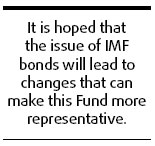China's agreement to buy the first bonds issued by the International Monetary Fund (IMF) for up to US$50 billion will understandably spark hot domestic debate over how the country should deploy its increasingly huge foreign exchange reserves.
However, as part of the global effort to increase IMF lending resources, this unprecedented note purchase agreement should, to a large extent, be measured by how it will enhance the Fund's role in fighting the global financial crisis.
Admittedly, as the IMF pointed out, the agreement offers China a safe investment instrument.
With more than $2 trillion in foreign reserves, China is in dire need of a new investment vehicle to help diversify its foreign holdings beyond US treasury bills, in which it is believed that the country has kept a disproportionately large share of its reserves.
Though it appears unnecessary to cut its holding of US treasury bills in the near term, the country's foreign exchange reserves will only get more diversified in the long run.
In this sense, the purchase of IMF notes marks a welcome step forward towards diversifying China's foreign exchange reserves.

More important, it can also boost IMF's capacity to help its members - particularly the developing and emerging market countries - weather the global financial crisis, and facilitate an early economic recovery.
Emerging signs show that the global economy is putting the worst behind it, but recovery is expected to be sluggish and financial systems remain fragile.
By significantly expanding its lending capacity, the IMF is making needed preparation for any unforeseen economic downturn that the world still cannot rule out.
A thickened financial cushion will certainly enable the Washington-based IMF to better finance those countries hit hardest by future economic downturn.
But that does not amount to a sufficient response to the worst global financial and economic crisis since the 1930s.
Consider this: Although Asia has almost $4 trillion in currency reserves, the combined voting rights of Japan, China and India in the IMF are lesser than that of the United States and half of the EU members.
Without taking steps for reforming the IMF in line with this new global economic reality, how can this institution possibly mobilize global resources proportionately and thus efficiently address global challenges?
Global leaders have reached a consensus on the significant role of the IMF in dealing with the current crisis. It is hoped that the issue of IMF bonds will lead to changes that can make this Fund more representative, and hence, more relevant in pulling the world economy out of the worst recession since the World War II. |

